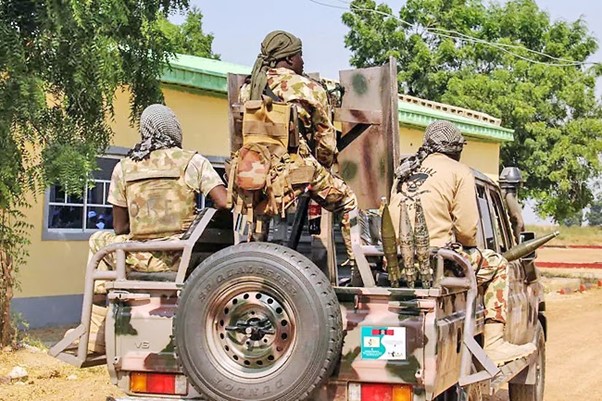‘Rotate Us, Our Morale Is Very Low’- Nigerian Soldiers Petition Army Leadership
Nigeria’s Chief of Army Staff promised to address the problem of troops overstaying at the war front about a month ago, but soldiers are still waiting anxiously for results.

Soldiers deployed for counterinsurgency operations in Borno State, Northeast Nigeria, have again pleaded to be rotated, having spent over five consecutive years at the war front in the fight against terror groups.
Members of the 3 Battalion operating in the Gamboru/Ngala and Rann areas of the state lamented that their overstay in the theatre war has caused a dip in morale.
A similar complaint was made by the military personnel last December.
“We have been for over five years now. Some days ago, most of our Muslim brothers were even complaining that this is our sixth year of fasting [during the month of Ramadan] on this ground now,” one soldier, who pleaded not to be named, told HumAngle.
“And it has not been easy for everyone here. It is very bad. The morale is not there.”
He said his corps of infantry soldiers had thought they would finally be replaced by a fresh batch of soldiers in February but have still not heard anything about their rotation.
Other corps, he observed, were not facing the same challenge, adding that they have no idea why their corps commanders are not responding favourably.
“This thing really brings down our morale because all our mind is not here to fight Boko Haram anymore. This is our problem. Every soldier here, our morale is very low,” he continued.
“That is why we want to plead with the Chief of Army Staff to do something about changes so that at least we can go back to our families to regain our morale, so that we can come back and replace others and we can be changing ourselves. And then the morale will be there to fight the Boko Haram and finish the insurgency.”
On Sunday, Feb. 21, Ibrahim Attahiru, Nigeria’s Chief of Army Staff had promised to give troops necessary support during an operational visit to Army Super Camp 9 in Dikwa, a Borno Local Government Area.
“We have presented certain issues that came up. Overstay of soldiers, sooner rather than later, we will address. Where there are no adequate vehicles, we will provide,” he had assured.
About a month later, soldiers at the war front in the northeast are still waiting for this promise to be fulfilled.
A soldier from the 3 Battalion noted that their low morale and lack of willingness to continue fighting made it possible for terrorists to dislodge them, damage their equipment, and burn their camps.
“While, you see, the officers, they are changing themselves every two years. They will come, they will go, they will bring other ones. Since we got here, we have had up to three to four sets of officers. And we the soldiers, we are suffering,” he said.
“This is our third commanding officer. Each of them is staying here for just two years. This one now, by December, his posting will come and he will leave us. That is why we plead on the Chief of Army Staff to help us so that at least we will go back to our families and stay with them for a while.”
Various studies have found a relationship between the likelihood of developing Post-Traumatic Stress Disorder (PTSD) and long stay of Nigerian soldiers in mission areas. But the effects of prolonged deployment and low morale are not only felt after a soldier has returned to the barracks, they also affect the performance of the operatives during battles.
Former Chief of Army Staff Lt. Gen. Tukur Buratai had traced setbacks faced by the military to “insufficient willingness to perform assigned tasks or simply insufficient commitment to a common national and military course by those at the frontlines”.
Support Our Journalism
There are millions of ordinary people affected by conflict in Africa whose stories are missing in the mainstream media. HumAngle is determined to tell those challenging and under-reported stories, hoping that the people impacted by these conflicts will find the safety and security they deserve.
To ensure that we continue to provide public service coverage, we have a small favour to ask you. We want you to be part of our journalistic endeavour by contributing a token to us.
Your donation will further promote a robust, free, and independent media.
Donate HereStay Closer To The Stories That Matter




